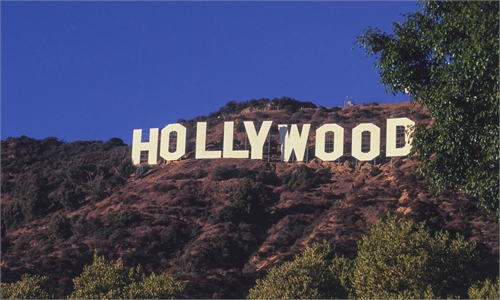
Illustration:Chen Xia/GT
A recent article from The New York Times, titled "Why China has lost interest in Hollywood Movies," has gained wide attention on social media.
The cooling reception of Hollywood in the Chinese film market has been a topic of discussion throughout 2023, given that none of Hollywood films made it to the top 10 in box office in China.
Renowned Chinese screenwriter and film critic Wang Hailin humorously described Hollywood's situation in China as being "knocked down and losing teeth" during a recent conference.
The article lists some reasons, including a lack of novelty and failing to catch up with China's marketing. And in the past few years, this big system has encountered some problems, including an overemphasis on political correctness, endless mass strikes in the industry, and so on.
Formerly, Hollywood films were highly sought after by Chinese audiences, whether on the big screen or in home theaters.
In recent years, from the Chinese perspective, Hollywood blockbusters, aside from the bombardment of visual spectacle, have failed to bring a sense of novelty, only introducing tedious franchises, leading to aesthetic fatigue.
This all happened in the meantime of Chinese audiences showing a heightened interest in relatable local stories, actively promoting their own narratives.
Media reported that the top-grossing film globally in 2023 was Barbie, earning $1.4 billion, with only 252 million yuan ($35 million) coming from the Chinese mainland market.
The Super Mario Bros. Movie became the second biggest box-office hit by grossing $1.3 billion, with 171 million yuan coming from the Chinese mainland.
Chinese films like director Zhang Yimou's Full River Red and The Wandering Earth II ranked the seventh and eighth worldwide, showing the big potential of Chinese films.
"Now, it's not China's domestic films that need to be promoted in a particular film season, but rather Hollywood's," Wang commented with a sense of humor.
"We can no longer compare Chinese films to the national soccer team's poor performance. China's film achievements in 2023 are something to be proud of," Wang remarked.
More importantly, the ideological emphasis in US films, which Hollywood long plays well, has been rejected by the Chinese audience.
It is ridiculous that The New York Times uses the example of the Top Gun franchise, where a "Taiwan flag" is displayed, to prove the Chinese audience is hard to please.
How can anyone expect a film that does not respect Chinese audiences to win recognition in the market?
The portrayal of US scenarios and values in movies, especially in stark contrast with reality, has led to a sense of weariness among Chinese viewers.
There are obviously other reasons for the Hollywood's tumble in China, which the NYT article failed to convey.
According to Maoyan, China's major ticketing office platform, Hollywood films grossed the biggest box office in the Chinese market in 2018 among the top 10 films, and began to decline starting 2019 and maintained the trend till today.
While the pandemic may have played some role, this trend coincides with the US government's explicit targeting of Chinese tech and economic sectors - in some fields trying to strangle Chinese market players using administrative means.
It could open new door for NYT and such to gain a more thorough understanding of the attractiveness of US culture in China if they look into how much influence the States' arrogance toward the Chinese public - including moviegoers - has been at play.
When Hollywood's preaching of values shows serious inconsistency with reality, its films became hard to sell in China.
As a result, during the summer of 2023, despite several major US films competing alongside domestic productions, iconic IPs like Transformers, Spider-Man and Mission: Impossible Dead Reckoning Part One were outperformed by Chinese films, including Chang An, Creation of the Gods I: Kingdom of Storms and No More Bets.
While Hollywood stars like 62-year-old Tom Cruise engaged in intense action scenes to reclaim the glory of Hollywood's action blockbusters, other established IPs faced dismal outcomes.
Another factor that cannot be ignored is the rise of digital entertainment.
With the development of internet technology, Chinese audiences now have more choices for entertainment content. They can watch movies and TV shows through various online platforms or participate in online games and social media activities. This digital entertainment shift has intensified the competition for Hollywood films in the Chinese box office.
In 2024, Hollywood has scheduled the release of certain films in the Chinese mainland, including Argylle, Dune 2, Kung Fu Panda 4, and Godzilla x Kong: The New Empire.
Amid the rise of high quality films rooted in Chinese culture, whether Hollywood can reverse its trend of spiraling down in the Chinese market and regain its status among audiences remains a big question.
The author is a reporter with the Global Times. life@ globaltimes. com.cn




